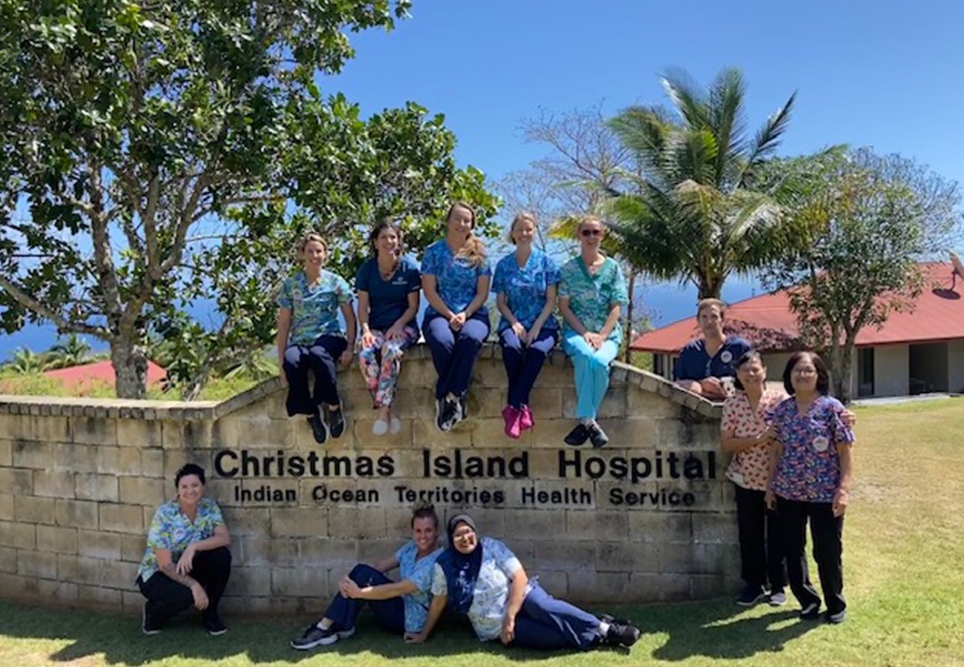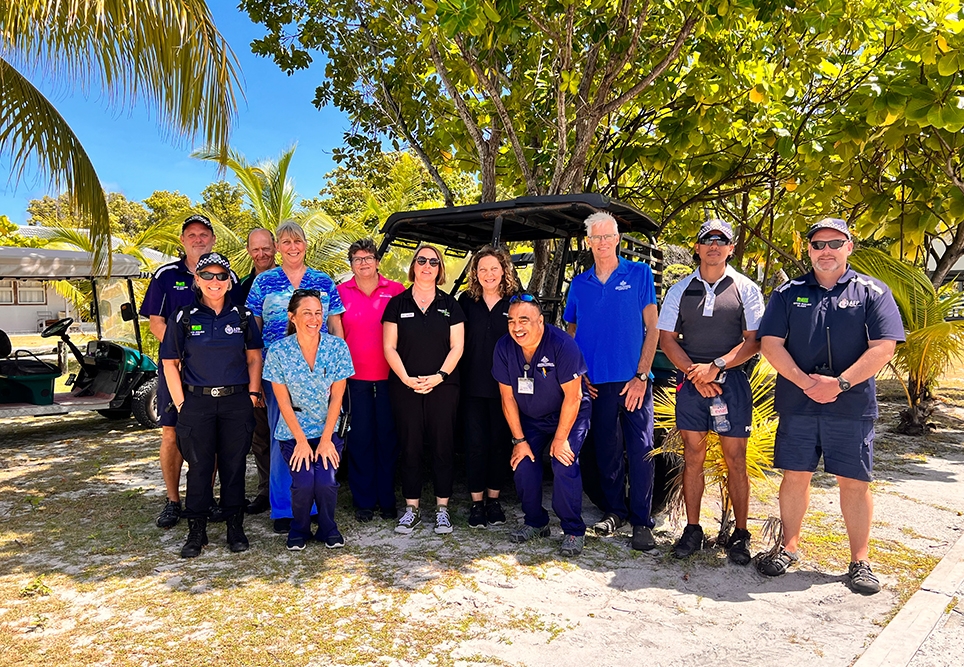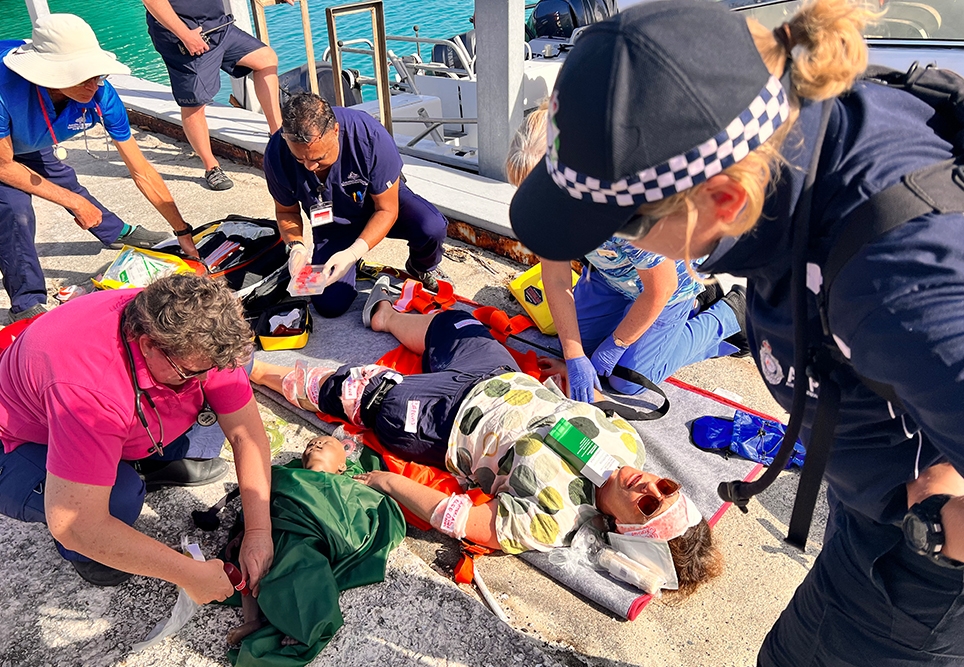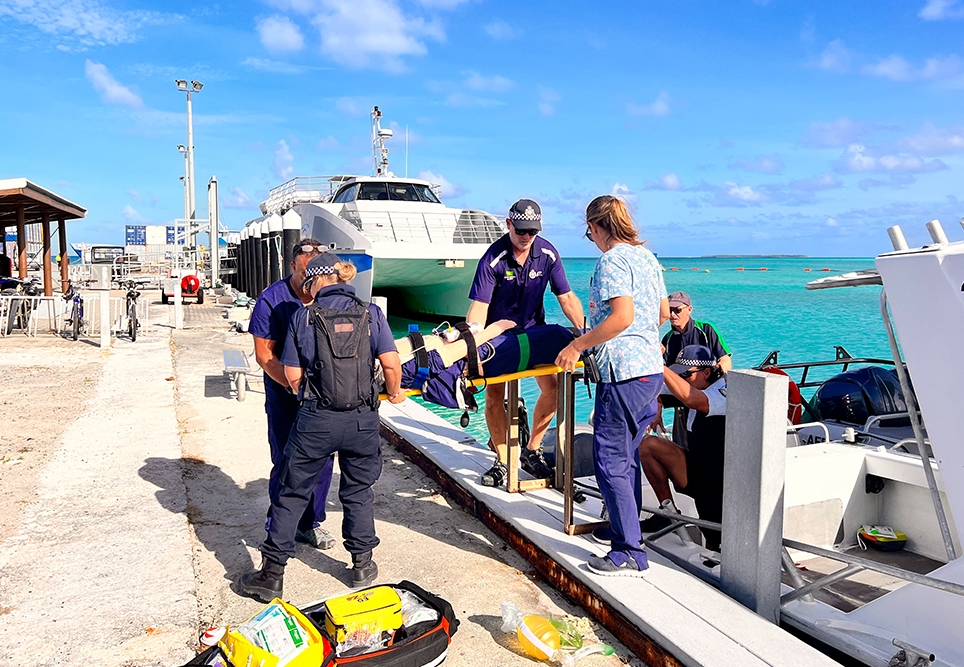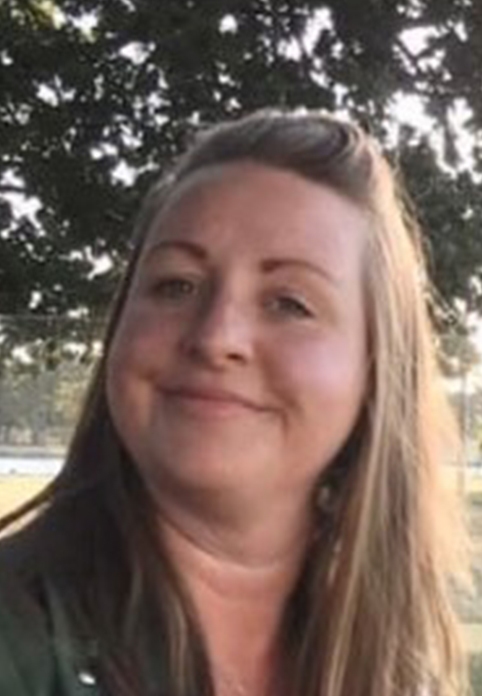This site may not work properly using older versions of Edge and Internet Explorer. You should upgrade your browser to the latest Chrome, Firefox, Edge, Safari, or any other modern browser of your choice. Click here for more information.
Your Stories
This is where we tell your stories, cover topical issues and promote meaningful initiatives.
Adapting CRANAplus education
“The challenge was on, like an episode of Ready, Steady, Cook with only five ingredients to make a six-course dinner, we were off to Christmas Island and Cocos (Keeling) Islands to deliver ten courses, with five CRANAplus Educators, carry-on equipment and only seven weeks to prepare,” says Anna Heaton, Clinical Educator CRANAplus. Here, Anna and team share their insights to tailoring and delivering CRANAplus courses for a specific environment.
This is exactly what CRANAplus Education is designed to do: deliver education right to the heart of remote area nursing. And I know everyone was excited about this assignment. A visit to these beautiful islands had nothing to do with it, of course.
It was not all plane sailing (see what I did?) as Leanne Laurie, Remote Clinical Educator, shares her diary entry dated 5th August:
Our day was finally here. Excitement was palpable, bags packed, and we were ready to go! Here we are 18 months on from the floating of our PEC/PALS course delivery to boarding the plane to deliver 10 CRANAplus courses over 12 days. A huge undertaking for Indian Ocean Territories Health Service (IOTHS), participants and facilitators/educators.
We arrived at the airport three hours early. At security, we embarrassingly had all our food and drink supplies confiscated because we failed to realise we were going International. After restocking on the other side, we boarded to settle into our four-hour flight to Christmas Island.
All was going well. We excitedly chatted about the day finally arriving, and we really couldn’t believe it was finally happening. As we commenced our descent, we were advised that the clouds were very low and that we would circle around until they lifted so we could land.
Still, with high optimism, we gazed out of the window, catching glimpses of the paradise we were so close to yet so far from. We could see the white beaches and turquoise waters surrounded by lush green foliage; it was calling our names.
And then, like a rocket, we soared back high in the sky. Our hearts were like stone as the captain announced we could not safely land. We were off to Java to refuel.
That’s OK. We would refuel and head back. The clouds would have lifted, the weather would have cleared, and we will just be a few hours delayed. But to our dismay, as we sat like a stranded whale on the tarmac refuelling, we were told “No, you are headed back to Perth”. The silence was deafening, the shock settled in, and our hopes were dashed.
That was a very long, mystery flight to nowhere. We all sat with our heavy hearts and hoped we would find another way to get where we needed to be.
We arrived back in Perth only to be absolutely drenched by torrential rain, with a two hour wait for accommodation and transfers to be sorted, with no word on any recovery flight in sight. By 2am, we were right back where we had started that morning.
The good news is that we did make it, albeit 48 hours later. One thing remote area nurses are good at is adapting under pressure. Plan D was hastily developed and activated.
The Indian Ocean Territories (IOT) is a unique place to work. Both islands are closer to Indonesia than Australia and house a melting pot of different cultures. Christmas Island is predominantly of Chinese descent and has a large Malay population.
The hospital here has a small emergency department and general ward and serves a population of approximately 1,700 people. Cocos (Keeling) has a total of 27 islands covering a land mass of 14 km². Only two islands are inhabited and have a small healthcare clinic. They have a total of one nurse unit manager, five registered nurses, one doctor and three health workers covering both clinics, serving a population of approximately 600 people.
The islands did not disappoint. On arrival, we were met with a unique land of rugged landscapes, ancient forests, abundant marine life, soaring sea birds, wild coastlines, remote, picturesque tropical beaches… and lots of crabs.
The courses
Remote Emergency Care (REC), and Paediatric Emergency Care and Paediatric Advance Life Support (PEC+PALS) combined
Anna Heaton, Remote Clinical Educator, Emergency Stream
Resources, including precious healthcare staff, are limited in such a remote environment. This left us with only a short time to deliver the best emergency care education that we could. We combined our leading courses by providing all the theory online.
The workshops then focused solely on developing skills and putting theory into practice. The scenarios were written to fit the clinical environment, and a technical debrief/discussion included the different considerations and skills required across the lifespan. This enabled the learning outcomes of both the adult and paediatric courses to be fully covered.
Cocos (Keeling) Islands had requested an Advanced Remote Emergency Care course, which was again adapted to be appropriate to the environment. This course included advanced skills, including front-of-neck access and chest drains.
The scenarios were developed to include advanced critical care considerations when dealing with acutely unwell emergencies such as sepsis and burns in such a remote environment. The highlight of this course was running a mass casualty scenario that included the Australian Federal Police (AFP) and all clinical staff.
The scenario commenced on the AFP boat and involved three casualties, including a 45-year-old male having had a cardiac arrest and upturned the boat. His 37-year-old wife was thrown overboard, sustaining major injuries including C‑Spine precautions, fractured pelvis, fractured femur, multiple lacerations and an embedded propellor blade. The couple’s child, an 18-month-old, was also thrown into the water, sustaining a submersion injury and later deteriorated and arrested. The scenario involved four AFP staff, six local nursing and medical staff, along with numerous keen bystanders willing to help.
After patients were stabilised on the boat and the jetty, they were transferred by mule (not the four-legged one) back to the clinic for further treatment, management and evacuation.
There were lots of challenges with limited resources, much improvising, and a whole lot of skill demonstrated in treating and managing the casualties successfully. The team provided outstanding emergency health care. This was a fantastic exercise in team collaboration, communication and best use of resources. I think we left Cocos (Keeling) with some food for thought.
Practical Skills course
We concluded the Emergency Stream courses with four fun sessions: plastering, suturing, emergency eye care and ear presentations. The day was all about lots of hands-on practice while learning valuable skills. We saw some terrific suturing techniques. The emergency stream courses ended with everyone acquiring at least one plastered limb. It was great fun all around.
Midwifery Emergency Care (MEC) course
Amanda Forti, Remote Clinical Educator, Midwifery Stream
The MEC courses were busy and fun, filled with Leonie and I teaching in tandem to deliver a truncated program. Both doctors and nurses well received the program. Delivering MEC in 12 hours or less was an exemplar of what can be achieved in a limited timeframe with a small team of health professionals who usually work together.
Having minimal equipment to teach with (only that which we could carry) provided some challenges, and the odd raised eyebrow from customs officers as they noted the replica human pelvis in my hand luggage as I went through security. Fortunately, the paediatric mannikin, pregnant belly, model placenta and birth instruments were all checked in.
It was wonderful getting to know the IOHT team, and we were extremely grateful for the opportunity to experience the delivery of maternity care, work, and life in this very remote setting. We also had the opportunity to explore and spend time in a place of incredible natural beauty (particularly underwater), affording us lifelong memories.
First Line Triage (FLT) course
Leonie McLaughlin, Remote Clinical Educator, Midwifery Stream
A First Line Triage (FLT) course was conducted on each island. This course focuses on the triage of patients and appointment management in the primary health setting. The aim was to upskill the non-clinical primary health practitioner to confidently assess patients whilst applying the principles of triage to ensure patients receive appropriate care. Both were delightful, engaged groups made up of admin and some health worker staff. Each half-day session involved lots of discussion, relevant case studies, and facilitation, enabling the group to tease out local issues and create potential solutions together. The content around the importance of positive and effective communication across all roles within the clinic was enjoyed and actively engaged with.
The participants’ feedback on the day was very positive. They reported that the course had really helped them understand their roles and responsibilities. Providing a theoretical framework reinforced the need to follow an agreed-upon, consistent, and formal triage process in their primary care/clinic settings. It even extended to the request that the clinical staff be informed of their triage process as well.
A very rewarding teaching and learning experience for myself and these key members of the teams in the Primary Health clinics on the islands.
The greatest benefit for us as educators and for the staff, was not only delivering the workshop in the environment in which they work, but also working with the whole of the team. It was fascinating to see how everyone slipped into their normal roles. They were incredibly supportive of each other and debriefing included some thought-provoking discussions on how they could improve their emergency care moving forward.
Amanda Forti sums it up beautifully:
The entire journey was a career highlight for Leonie and myself. Sharing the experience with each other, the emergency stream educators and our remote colleagues was a rare experience of what working as a Remote Area Nurse and Remote Clinical Educator (Nurse & Midwife) can look like.
None of these courses could have gone ahead without the amazing dedication and support of both the Nurse Managers and Clinical Educators, Vicky and Leah, on the islands.
There were about a thousand emails and phone calls as we tried to gather information about the diversity of the care they deliver, the emergencies that present and how these are managed in this unique environment. We were dedicated to tailor-making these courses to be of the best learning benefit to all the staff.
In addition, huge thanks to our fabulous volunteer facilitator Steve Gust who just goes with the flow and his lovely wife who made for an excellent Trauma patient. The mass casualty would not have been the same without you.
I think I can honestly say, that whilst it was an exhausting time for everyone involved, the experience was illuminating, highly educational and a whole heap of fun! We look forward to visiting again. Thank you from everyone at CRANAplus Education.
Anna Heaton, Remote Clinical Educator, CRANAplus
